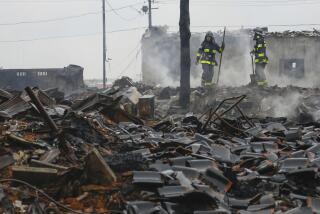Peacekeeper’s Death Provokes a Crisis in Tokyo : Japan: Ambush killing brings calls for the nation to pull out of the U.N. operation in Cambodia.
- Share via
TOKYO — When this country sent troops to participate in the U.N. peacekeeping operations in Cambodia last fall, the Japanese took pride in having made a major stride toward fulfilling their responsibilities as a world power.
Many believed that Japan no longer could be accused of ducking its duties by contributing only money, as it had during the Persian Gulf War.
But since Haruyuki Takata, a 33-year-old Japanese policeman, was killed in an ambush while on patrol last week near the Thai-Cambodian border, Japan appears to have lost its nerve. His death, which has dominated headlines here for a week, has plunged Japan into a domestic crisis, with politicians and influential newspapers calling for withdrawal of Japanese forces from Cambodia.
Prime Minister Kiichi Miyazawa is resisting the pressure. “We are sorry, but we must achieve the objective of holding the (May 23-28 Cambodian) election, while making sure that this sort of thing does not happen again,” Miyazawa said in a televised news conference Wednesday. “That, I believe, is the international contribution demanded of us.”
Miyazawa said Tuesday in Parliament that Japan is “not at the stage of considering the suspension or withdrawal” of its peacekeepers in Cambodia.
But any further Japanese toll--Takata’s death was the second of a Japanese in Cambodia--will create such concerted public criticism that Japanese leaders may have little choice but to withdraw their troops from the multinational operation, experts say.
Miyazawa already has seen a member of his Cabinet break rank. Junichiro Koizumi, the outspoken posts and telecommunications minister, has called for withdrawal, insisting that “there is no argument that (Japan’s peacekeepers) should go so far as to shed their blood.”
He is playing to a receptive audience. In a survey conducted by Asahi Television, one of Japan’s leading broadcasters, 52% of 1,000 people who were polled wanted Japan to pull its forces out of Cambodia. Nihon Keizai, Japan’s powerful business daily, urged Japan to offer financial aid to the United Nations rather than military help.
Experts fault Miyazawa for understating the danger of peacekeeping efforts to win passage of a law last June permitting the government to send troops overseas for such efforts.
“The government never explained the danger of sending people to the front,” says Naoki Saito, a professor of international studies at Tokoha Gakuen Fuji Junior College in Shizuoka. “Nobody ever dreamed that somebody might actually die.”
Japan’s panicked reaction to Takata’s death suggests that even the government didn’t know what it was getting into.
Now, instead of reaffirming its commitment to the multinational peacekeeping effort in Cambodia, Japan appears to be pleading for extra protection for its forces.
Home Affairs Minister Keijiro Murata flew to Phnom Penh last weekend to ask the U.N. Transitional Authority to guarantee the safety of the 600 Self-Defense Force soldiers and 75 civilian police stationed in Cambodia. He asked that the police, now stationed in dangerous regions, receive special permission to pull back to safer quarters near Phnom Penh; Murata also asked that 41 new Japanese poll monitors be sent to a safe region in the south.
Although Yasushi Akashi, who heads the U.N. authority in Cambodia, agreed to send new volunteers to the safer southern region, using the argument that Japanese Self-Defense Forces were already stationed there, he refused to give special treatment to existing Japanese forces.
“It may look very selfish, but we have to ask (the United Nations) to take all possible actions to protect our troops,” a senior Foreign Ministry official said Tuesday. “If we fail in this first case, it will take at least another few years before we could participate in another (such) operation.”
Japan may gradually come to accept the dangers.
“Japan is like a man who has tried to help a beast caught in a trap and was bitten,” said Takehito Nakata, 55, whose son, a volunteer, was killed in Cambodia last month. “We feel like we are trying to help, and we wonder why we are being attacked.”
Nakata, a business executive who quit his job to start a foundation in his son’s name to encourage Japanese to continue with their international peacekeeping efforts, believes that Japan will see the light.
“Right now, Japan is upset, but if everything remains calm, Japan will remain committed because Japan wants to be a good member of the international community,” he said.
But there is little sympathy for his cause. Japanese volunteers themselves are asking to leave.
“How many of us will have to die before you decide to pull us out of Cambodia?” Hiroto Yamazaki, head of the Japanese civilian police corps in Cambodia, asked in a meeting with Murata.
What keeps Japan from pulling out of Cambodia is fear of international condemnation. Even those Japanese unsympathetic to the Cambodian peacekeeping effort recognize that withdrawal could damage Japan’s international standing.
More to Read
Sign up for Essential California
The most important California stories and recommendations in your inbox every morning.
You may occasionally receive promotional content from the Los Angeles Times.












